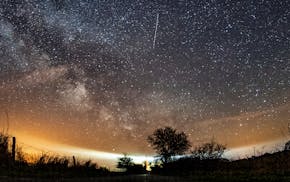JOHANNESBURG
Elephants at Hluhluwe-iMfolozi Park, South Africa's oldest game reserve, have begun receiving a contraceptive vaccine to control the pachyderm population. The game reserve is the largest in the program, which now includes 20 parks, according to the statement by the Humane Society International, an animal conservation organization.
"The immunocontraceptive program allows elephant populations to be managed humanely, especially in small enclosed parks and private conservancies," said the group.
While elephants are endangered across much of Africa, in Southern Africa many parks are overpopulated, leading to damage to ecosystems as the animals, which can weigh 6 metric tons and stand 10 feet at the shoulder, tear down trees.
In the past, including in South Africa, they have been culled, leading to protests from animal rights organizations. Moving the animals from one area to another is usually considered too expensive.
The about 600 elephants in Hluhluwe-iMfolozi come from a population of 160 introduced between 1985 and 1991 when they were moved from the Kruger National Park, which was considered overpopulated with elephants, according to the park's website.
Slowing the growth of the elephant population is converse to the problem South Africa faces over a threatened rhino herd.
At least 769 rhinos have been poached this year in the nation, with two-thirds of those being killed in the Kruger park, compared with a record 1,004 slaughtered in all of last year.
The vaccine, injected into African elephant cows by dart gun, is a non-hormonal treatment, the groups said. "It is also reversible, allowing managers to fine-tune population growth."
Africa has 470,000 to 690,000 elephants, according to the WWF. Of those, 300,000 live in southern Africa.
Bloomberg News

NASA hears from Voyager 1, the most distant spacecraft from Earth, after months of quiet

The House votes for possible TikTok ban in the US, but don't expect the app to go away anytime soon

Why you should donate clothing: It (probably) won't end up at the dump

Apple pulls WhatsApp and Threads from App Store on Beijing's orders
